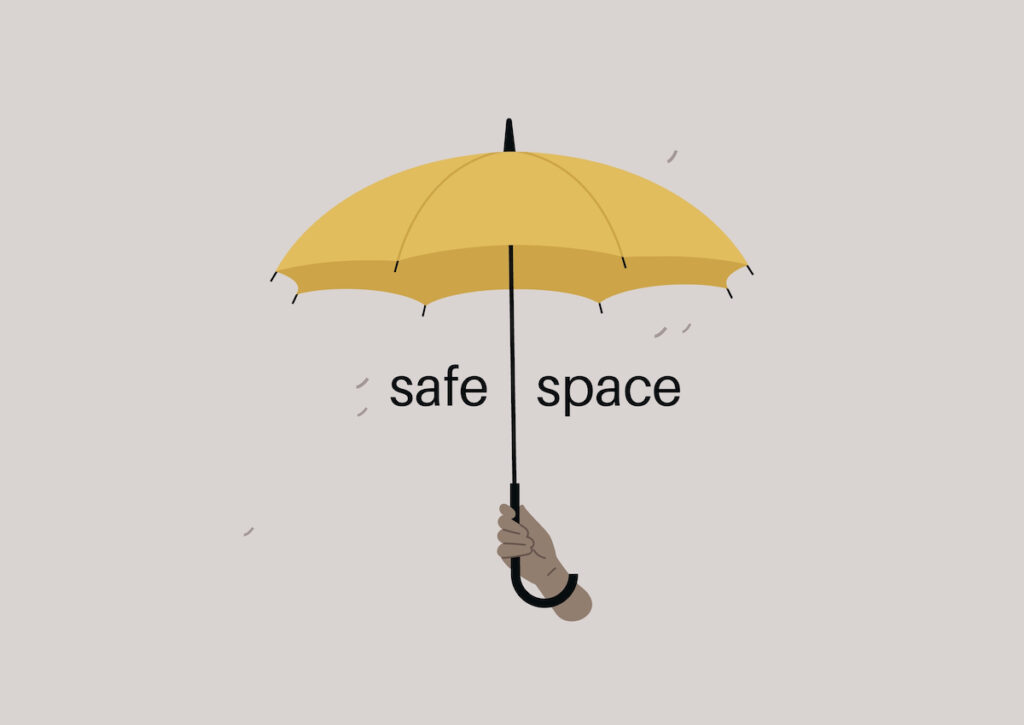
Coercion is a contentious element of mental health treatment and impacts on the relationships between patients and healthcare practitioners (Allison and Flemming, 2019). It has been previously discussed by several writers here on Mental Elf, e.g., John Baker blogged about the efficacy of interventions to reduce coercion and patient’s views on coercion, and Ian Cummins has blogged about patients’ experiences of coercion. The authors of the study I am writing about (Tinland et al, 2022) also refer to the detrimental effects of coercion and investigate an intervention to improve care experiences and relationships between patients and healthcare practitioners.
Tinland et al. (2022) investigated whether peer worker (i.e., people with personal mental health experience employed to support others) supported psychiatric advance directives (PW-PADs) are effective as a means of reducing coercive involuntary hospital admissions and increasing patient autonomy. Psychiatric advance directives (PADs) are written documents of a person’s preferences that can be applied should they experience a future crisis and where their decision-making capacity is impaired. The authors suggest that PADs could improve patients’ autonomy and self-determination if the development of them are facilitated by professionals, such as peer workers, who are unlikely to exert undue influence (i.e., subtle coercion). The study was conducted in France, where advance directives are legally recognised under French legislation since 2005.
Several randomised controlled trails (RCTs) have evidenced PADs as the most effective intervention to reduce coercive involuntary admissions to psychiatric hospitals (Tinland et al, 2022). However, given a lack of any previous investigations into the effect on clinical outcomes of PADs facilitated by peer workers, this study investigated whether PW-PADs can, primarily, reduce compulsory hospital admissions. Specifically, the primary outcome of the study was the rate of compulsory admissions to a psychiatric hospital at 12-month follow-up (number of patients with at least 1 compulsory admission divided by the number of participants). More ambitiously, secondary outcomes were care-related (overall voluntary/involuntary hospital admission rate, total number of voluntary/involuntary hospital admissions per patient, and the rate of non-compulsory admissions per patient), patient-reported (quality of life and health status), and mental health outcomes (symptomatology, empowerment, and recovery).

Psychiatric Advance Directives (PADs) can effectively reduce coercive involuntary admissions to hospitals, but will this still be effective when supported by peer workers?
Methods
In total, 401 participants met the eligibility criteria (aged over 18 years; involuntary hospital admission within the past 12 months; received a diagnosis of schizophrenia, bipolar I, or schizoaffective disorders according to DSM-5 criteria; and decision-making capacity). Participants’ eligibility status was checked by their psychiatrist, and they were then randomly assigned (non-blinded) on a 1:1 ratio (i.e., allocated equally in numbers) to either the intervention (PW-PAD) or control groups across 7 mental health facilities. At the time of study inclusion, most participants were discharged from hospital. Following randomisation, a research assistant then met participants from both the intervention and control groups for face-to-face interviews at the time of study inclusion and at 6 months and 12 months.
Both groups of participants received the PAD document, which included future treatment and support preferences, early signs of relapse, and coping strategies. However, the PW-PAD intervention group were invited to meet with a peer worker in their preferred location. The peer worker then supported PW-PAD participants to draft and share the PAD document with healthcare practitioners. By contrast, participants from the control group did not receive any input from a peer worker to draft or share the PAD.
Results
All randomised participants were included in the analysis (intention-to-treat analysis). Upon completion, 196 and 198 were analysed for the intervention and control groups, respectively. There were similar baseline characteristics between groups, although the PW-PAD group included more men and a slightly lower median score of severity of symptoms.
Psychiatric Advance Directive (PAD) completion
- Far more of the PW-PAD group participants (n=107; 54.6%) completed the PAD documents compared to the control group (n=14; 7.1%).
- However, perhaps surprisingly, less than half of the PW-PAD participants (n=81; 41.3%) met and wrote their PADs with peer worker support compared to the control group (n=4; 2%).
- Finally, significantly more PW-PAD participants (n=29; 27.1%) used the PAD during a crisis in the 12-month follow-up period compared to the control group (n=5; 2.5%).
Primary outcome: rate of compulsory admissions
- PW-PAD participants had a significantly lower rate of compulsory hospital admissions (n=53; 27%) compared to the control group (n=79; 39.9%).
Secondary outcomes: symptoms, empowerment, recovery, admission rate, therapeutic alliance, quality of life
The authors also report several secondary outcomes that were significantly better for PW-PAD participants compared to the control group. PW-PAD participants were measured to have:
- lower symptoms (according to the modified Colorado Symptom Index),
- greater empowerment (as measured by the Empowerment Scale), and
- better recovery (as measured by the Recovery Assessment Scale).
There were no statistically significant differences between the PW-PAD and control groups for overall admission rate, therapeutic alliance, or quality of life.

Participants who received peer worker supported psychiatric advance directives (PW-PADs) had lower rates of compulsory psychiatric admission.
Conclusions
The authors concluded:
Among people living with schizophrenia, bipolar I disorder, or schizoaffective disorder, the use of PW-PADs was associated with a significant decrease in compulsory admissions and a significant increase in some mental health outcomes (self-perceived symptoms, empowerment, and recovery). These findings support the use of PW-PADs for people with schizophrenia, bipolar I disorder, or schizoaffective disorder. Legal and organizational initiatives that promote supported decision-making can develop the activity of peer workers to fulfil this mission.

This recent French study published in JAMA Psychiatry supports “the use of PW-PADs for people with schizophrenia, bipolar I disorder, or schizoaffective disorder”.
Strengths and limitations
The authors report two major strengths of the study: patient participation throughout the study, and broad representation of psychiatrists and peer workers from a range of psychiatric services.
They also highlight four limitations:
- First, the effect on the follow-up period from the Covid-19 pandemic and loss of 31% of participants at the 12-month follow-up, which weakened the power of the study regarding the secondary outcomes. This last point simply means there was a reduced probability of finding a significant relationship regarding the secondary outcome measures. This may also account for the small effect size regarding the lower symptom and greater empowerment scores from the PW-PAD participants.
- Second, unequal recruitment of participants among the 7 different centres meant that comparisons could not be made between the centres.
- Third, the authors infer that a lack of training for peer workers and clinical teams about the relatively new PAD and peer worker role in France negatively affected the study results. This implies that greater knowledge and awareness of PAD and peer working will contribute to a reduction in symptoms and greater benefit in terms of admission rates, therapeutic alliance, quality of life, recovery, and empowerment.
- Finally, the authors report they included restrictive criteria, which may have limited the generalisability of the findings.
This was also a non-blinded study, which simply meant that all stakeholders were aware of which group the participants were assigned to. Typically, this can be a concern given the potential for several biases to affect the viability of the results. However, it would be obvious to participants which group they had been allocated to and so blinding would be impractical.
It’s also worth noting that there were more men and less women and a slightly lower mean age in the intervention group.
It is difficult to understand the discrepancy between the number of PW-PAD participants who met with a peer worker (n=107; 54.6%) and those who went on to complete the PAD (n=81; 41.3%) and then use the PAD in a crisis (n=29; 27.1%). This means that double the number of PW-PAD participants without peer worker contact (n=22; 11.3%) completed the PAD compared to the control group without peer worker contact (n=14; 7.1%). The authors report that qualitative research was also conducted, which will hopefully be published and provide further insight into these results.

The lack of training for peer workers and clinical teams about the relatively new psychiatric advance directives and peer worker role in France may have negatively affected the findings.
Implications for practice
Coercive practice poses ethical dilemmas for practitioners and imposes restrictions for patients (Chieze et al, 2021). Advanced planning of care and peer support are two of several approaches advocated by Mental Health Europe as a way to reduce coercive practice in mental health. In this study, Tinland and colleagues have demonstrated that including peer worker support in the development and sharing of advance directives compares favourably to leaving patients to do this on their own.
The results from this study provide a welcomed reduction in coercive practice in mental healthcare and it is encouraging to see this contribute to significant improvements in symptoms, empowerment, and recovery scores. The lack of significant difference between the PW-PAD and control groups in overall admissions suggests that PAD completion with peer worker support contributes to either less acuity of mental ill health at the point of admission and/or greater engagement between patients and practitioners at the point of admission to agree on a voluntary admission. I would hope this greater engagement at the point of admission would continue and contribute towards greater harmony between patients and practitioners during the subsequent treatment.

Peer support integration in the development and sharing of psychiatric advance directives show promising outcomes in the reduction of coercive practices.
Statement of interests
None.
Links
Primary paper
Tinland A, Loubière S, Mougeot F. et al (2022) Effect of Psychiatric Advance Directives Facilitated by Peer Workers on Compulsory Admission Among People With Mental Illness: A Randomized Clinical Trial. JAMA Psychiatry, 1;79(8), 752-759. https://doi.org/10.1001/jamapsychiatry.2022.1627
Other references
Allison R & Flemming K (2019) Mental health patients’ experiences of softer coercion and its effects on their interactions with practitioners: A qualitative evidence synthesis. Journal of Advanced Nursing, 75(11), 2274-2284. https://doi.org/10.1111/jan.14035
Chieze M, Clavien C, Kaiser S, Hurst S (2021) Coercive Measures in Psychiatry: A Review of Ethical Arguments. Frontiers in Psychiatry. https://doi.org/10.3389/fpsyt.2021.790886
Photo credits
- Photo by Cory Mogk on Unsplash
- Photo by Dayne Topkin on Unsplash

I don’t think this is what the trial described: “More effective when delivered” by a peer worker. I would specifically object to the “more”. It showed that this could be a role for peer workers but it didn’t establish whether peer workers can deliver this service better than a social worker for instance on a dose-equivalent manner – the intervention arm got unlimited peer support sessions and the control arm got standard care from a psychiatrist – nothing mentioned about whether the control arm had any input from a social worker (it seems not). It proves that peer workers may be beneficial as an add on to a stand alone psychiatry service but not an MDT delivering this intervention. Since psychiatrists in most countries work in MDTs are the results really transferable to these settings? Would a social work control intervention not be the gold standard reference? Also this trial was unblinded and if you read the protocol they were not unconcerned by contamination of the control arm. I would also like to see how efficacious the intervention was (as well as seeing how effective it was).